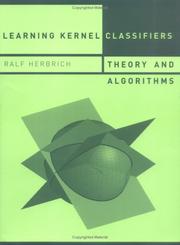| Listing 1 - 5 of 5 |
Sort by
|

ISBN: 1282096389 0262256339 9786612096389 0585436681 026208306X 9780262256339 9780585436685 9780262083065 0262263041 Year: 2002 Publisher: Cambridge, Mass. MIT Press
Abstract | Keywords | Export | Availability | Bookmark
 Loading...
Loading...Choose an application
- Reference Manager
- EndNote
- RefWorks (Direct export to RefWorks)
Linear classifiers in kernel spaces have emerged as a major topic within the field of machine learning. The kernel technique takes the linear classifier--a limited, but well-established and comprehensively studied model--and extends its applicability to a wide range of nonlinear pattern-recognition tasks such as natural language processing, machine vision, and biological sequence analysis. This book provides the first comprehensive overview of both the theory and algorithms of kernel classifiers, including the most recent developments. It begins by describing the major algorithmic advances: kernel perceptron learning, kernel Fisher discriminants, support vector machines, relevance vector machines, Gaussian processes, and Bayes point machines. Then follows a detailed introduction to learning theory, including VC and PAC-Bayesian theory, data-dependent structural risk minimization, and compression bounds. Throughout, the book emphasizes the interaction between theory and algorithms: how learning algorithms work and why. The book includes many examples, complete pseudo code of the algorithms presented, and an extensive source code library.
Engineering & Applied Sciences --- Computer Science --- Computer science --- Mathematical statistics --- Machine learning --- Algorithms --- E-books --- Algorithms. --- Machine learning. --- Apprentissage automatique --- Algorithmes --- Algorism --- Algebra --- Arithmetic --- Learning, Machine --- Artificial intelligence --- Machine theory --- Foundations --- COMPUTER SCIENCE/Machine Learning & Neural Networks
Book
ISBN: 3030291359 3030291340 Year: 2020 Publisher: Cham : Springer International Publishing : Imprint: Springer,
Abstract | Keywords | Export | Availability | Bookmark
 Loading...
Loading...Choose an application
- Reference Manager
- EndNote
- RefWorks (Direct export to RefWorks)
This volume presents the results of the Neural Information Processing Systems Competition track at the 2018 NeurIPS conference. The competition follows the same format as the 2017 competition track for NIPS. Out of 21 submitted proposals, eight competition proposals were selected, spanning the area of Robotics, Health, Computer Vision, Natural Language Processing, Systems and Physics. Competitions have become an integral part of advancing state-of-the-art in artificial intelligence (AI). They exhibit one important difference to benchmarks: Competitions test a system end-to-end rather than evaluating only a single component; they assess the practicability of an algorithmic solution in addition to assessing feasibility.
Artificial intelligence. --- Machine learning. --- Learning, Machine --- Artificial intelligence --- Machine theory --- AI (Artificial intelligence) --- Artificial thinking --- Electronic brains --- Intellectronics --- Intelligence, Artificial --- Intelligent machines --- Machine intelligence --- Thinking, Artificial --- Bionics --- Cognitive science --- Digital computer simulation --- Electronic data processing --- Logic machines --- Self-organizing systems --- Simulation methods --- Fifth generation computers --- Neural computers --- Optical data processing. --- Pattern recognition. --- Artificial Intelligence. --- Image Processing and Computer Vision. --- Pattern Recognition. --- Design perception --- Pattern recognition --- Form perception --- Perception --- Figure-ground perception --- Optical computing --- Visual data processing --- Integrated optics --- Photonics --- Computers --- Optical equipment
Book
ISBN: 1783989351 9781783989355 9781783989348 1783989343 Year: 2016 Publisher: Birmingham, England Mumbai [India] Packt Publishing
Abstract | Keywords | Export | Availability | Bookmark
 Loading...
Loading...Choose an application
- Reference Manager
- EndNote
- RefWorks (Direct export to RefWorks)
Multi
ISBN: 9783030291358 Year: 2020 Publisher: Cham Springer International Publishing
Abstract | Keywords | Export | Availability | Bookmark
 Loading...
Loading...Choose an application
- Reference Manager
- EndNote
- RefWorks (Direct export to RefWorks)
This volume presents the results of the Neural Information Processing Systems Competition track at the 2018 NeurIPS conference. The competition follows the same format as the 2017 competition track for NIPS. Out of 21 submitted proposals, eight competition proposals were selected, spanning the area of Robotics, Health, Computer Vision, Natural Language Processing, Systems and Physics. Competitions have become an integral part of advancing state-of-the-art in artificial intelligence (AI). They exhibit one important difference to benchmarks: Competitions test a system end-to-end rather than evaluating only a single component; they assess the practicability of an algorithmic solution in addition to assessing feasibility.
Mathematical statistics --- Electronics --- Telecommunication technology --- Artificial intelligence. Robotics. Simulation. Graphics --- Computer. Automation --- patroonherkenning --- factoranalyse --- optische communicatie --- optische elektronica --- datacommunicatie --- KI (kunstmatige intelligentie) --- AI (artificiële intelligentie)
Book
ISBN: 9783030291358 Year: 2020 Publisher: Cham Springer International Publishing :Imprint: Springer
Abstract | Keywords | Export | Availability | Bookmark
 Loading...
Loading...Choose an application
- Reference Manager
- EndNote
- RefWorks (Direct export to RefWorks)
Mathematical statistics --- Electronics --- Telecommunication technology --- Artificial intelligence. Robotics. Simulation. Graphics --- Computer. Automation --- patroonherkenning --- factoranalyse --- optische communicatie --- optische elektronica --- datacommunicatie --- KI (kunstmatige intelligentie)
| Listing 1 - 5 of 5 |
Sort by
|

 Search
Search Feedback
Feedback About UniCat
About UniCat  Help
Help News
News